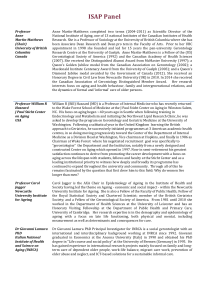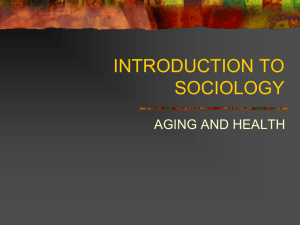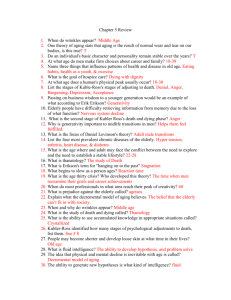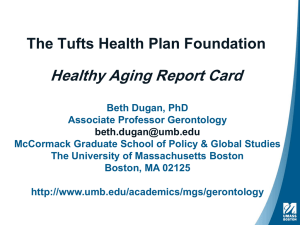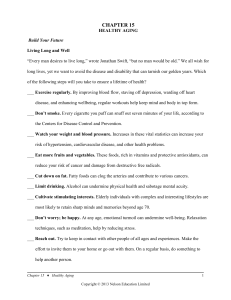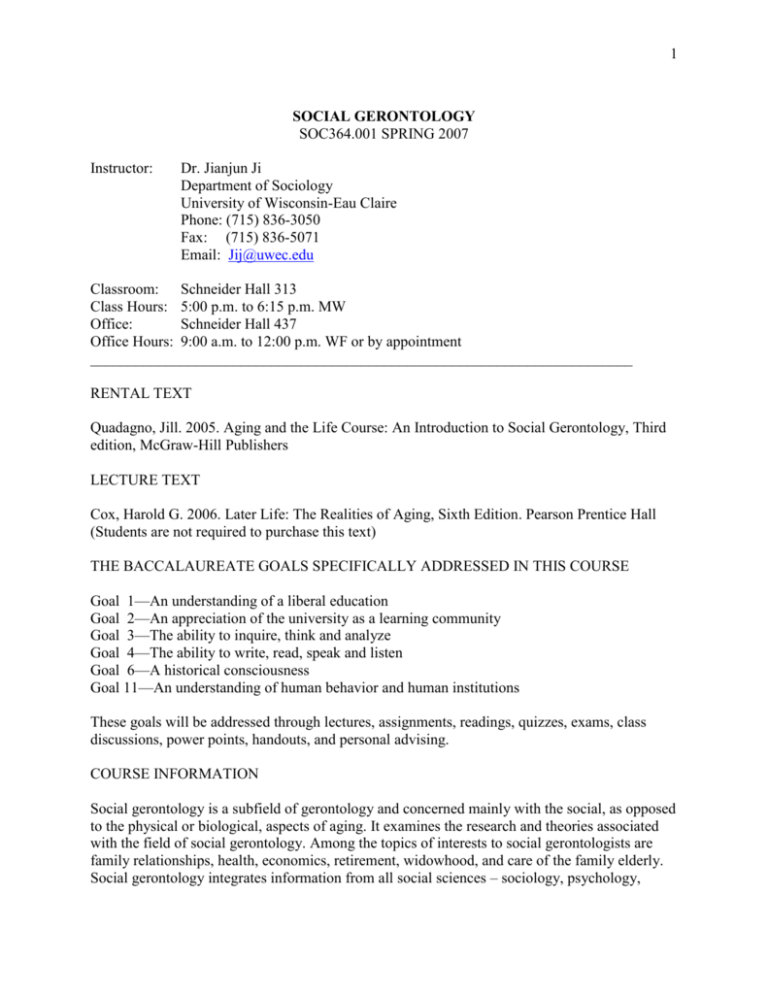
1
SOCIAL GERONTOLOGY
SOC364.001 SPRING 2007
Instructor:
Dr. Jianjun Ji
Department of Sociology
University of Wisconsin-Eau Claire
Phone: (715) 836-3050
Fax: (715) 836-5071
Email: Jij@uwec.edu
Classroom: Schneider Hall 313
Class Hours: 5:00 p.m. to 6:15 p.m. MW
Office:
Schneider Hall 437
Office Hours: 9:00 a.m. to 12:00 p.m. WF or by appointment
________________________________________________________________________
RENTAL TEXT
Quadagno, Jill. 2005. Aging and the Life Course: An Introduction to Social Gerontology, Third
edition, McGraw-Hill Publishers
LECTURE TEXT
Cox, Harold G. 2006. Later Life: The Realities of Aging, Sixth Edition. Pearson Prentice Hall
(Students are not required to purchase this text)
THE BACCALAUREATE GOALS SPECIFICALLY ADDRESSED IN THIS COURSE
Goal 1—An understanding of a liberal education
Goal 2—An appreciation of the university as a learning community
Goal 3—The ability to inquire, think and analyze
Goal 4—The ability to write, read, speak and listen
Goal 6—A historical consciousness
Goal 11—An understanding of human behavior and human institutions
These goals will be addressed through lectures, assignments, readings, quizzes, exams, class
discussions, power points, handouts, and personal advising.
COURSE INFORMATION
Social gerontology is a subfield of gerontology and concerned mainly with the social, as opposed
to the physical or biological, aspects of aging. It examines the research and theories associated
with the field of social gerontology. Among the topics of interests to social gerontologists are
family relationships, health, economics, retirement, widowhood, and care of the family elderly.
Social gerontology integrates information from all social sciences – sociology, psychology,
2
economics, and political science to seek understanding how the biological processes of aging
influence the social aspects of aging. The research findings generated from social gerontologists
can be used in the applied disciplines of social work, public administration, urban and regional
planning, many others to help professional design and implement programs and policies for
aging people in an aging society. By attending this class, students will gain insight into the social
aspects of the aging process, as well as the social experiences, rewards and challenges
confronting older people in society.
EXPECTATIONS OF STUDENTS
The primary instructional methods used in the course are lecture, broader class discussion, and
small group presentation. The lecture will be carried out by a well-organized power point. The
content of the lecture is based on Later Life by Harold Cox. There is also a fair amount of
reading and presentations for the class. Therefore, students should do their best to provide their
positive cooperation with the instructor by attending class consistently, keeping current on the
readings, taking good class notes, as well as actively participating in the small group work and
broader class discussions. Students will learn more from the course and gain a better
understanding of the subject at hand. Students will be responsible for both lecture and reading
materials for purposes of the examinations. In addition, all students should demonstrate academic
honesty in this course such that all graded work, except that explicitly designated as group work,
reflects only the efforts of each individual student. It is a sincere hope that academic honesty is a
rule in this course. Students should do all their work independently. Any occurrence of academic
misconduct such as plagiarism will be dealt with in accordance with the guidelines and
procedures outlined in the academic misconduct policy at the university.
COURSE REQUIREMENTS
Class Attendance
Consistent class attendance is expected of all students. Class attendance will be recorded
regularly in this course. In case of an illness or other types of absence, A WRITTEN NOTICE
should be given to the instructor. E-mail notice is NOT accepted. Absences will affect the final
grade. An absence will be one point deduction from the final grade. Students who are late for
class (20 minutes or more) or who leave class earlier without the instructor’s prior permission
will be taken as an absence. Any student who has a disability and is in need of classroom
accommodations, please contact the instructor and the Services for Students with Disabilities
Office in Old Library 2136 at the beginning of the semester. For those students with substantial
difficulties due to disability, absences will be excused. But they must contact the instructor by
phone, or e-mail within two class meetings after a missing class. Students who have 3 absences
during the semester cannot get “A” grade and who have 5 absences cannot get “B” grade,
regardless of other aspects of their performance.
Examinations
There will be three examinations given in this class. They will be most likely to be a combination
of multiple choice, true or false, essay, matching, and/or short answer definitions. No makeup
examinations will be given except under extreme circumstances (e.g. death in the family, a
student’s serious illness). If it is determined that a makeup examination is warranted, it will be
3
given at a time that is convenient for the professor. Since this is both a graduate as well as
undergraduate course, there will be separate grading scales for the undergraduates and the
graduates. All three examinations account for 60% of the final grade. The instructor reserves the
right to curve the final grade if necessary.
Research Project/Paper
Undergraduates will be required to do a research project based on five academic journal articles.
The research project assignment will be worth 10% out of the total grade. The detailed
information and requirements for doing this project are listed at the back of the syllabus.
Graduate students will be required to write a research paper on a topic in social gerontology. The
research paper will be worth a total of 10%. The detailed information and requirements for the
research paper are listed at the back of the syllabus.
Reading and Presentation
Fifteen chapters from the textbook will be assigned for reading and presentation. The class will
be divided into five groups each of which will have three presentations during the semester. Each
group must organize its reading and presentation and submit it (both a hard copy and an email
attachment are required) to the instructor prior to group presentation. Late submission and /or
unstapled assignments are not accepted. The reading and presentation make up 20% of student’s
final grade. This assignment serves as a supplemental material aiming to enhance the knowledge
of the discipline and is a very important component of the course. The criteria for evaluation on
reading and presentation are based on both quantity and quality including organization, logical
sequence, and completeness.
Other supplementary materials such as research papers, articles, extracts, statistics, charts,
outlines, and other work may be given during the course. In order to enhance understanding and
mastery of the subject matter, quizzes and short questions relevant to the discipline may be
assigned for group discussion. Additionally, audio-visual materials may be incorporated into the
course when appropriate.
Field Work
In order for students to have a real world experience, groups will be given field assignments to
be completed in the larger Eau Claire community. The specific tasks for each group are
described below:
Group 1 Visit a nursing home and learn the daily activities involved for caring the elderly.
Group 2 Search and report nursing home services in Eau Claire area such as numbers,
locations, patients, procedures, requirements, accomplishments, etc.
Group 3 Visit a hospital, church or hospice, learn and describe all activities involved before
and after a death taking place
Group 4 Visit a hospice and give a report on the activities involving taking care of patients
who are in the dying process
Group 5 Visit a graveyard management center/unit, learn and describe the procedures and
arrangements for burying the dead.
All these activities must be completed in a written format. Prepare to give a report on the
findings to class. This activity will take 10% of the final grade.
4
SYLLABUS
The syllabus serves as a “contract” between the instructor and the students. It is very important
that students read the syllabus carefully and make plans for themselves and act upon it
accordingly. Due to circumstances such as events, meetings, weather, and the like during the
semester, the syllabus may undertake some adjustments when it is considered necessary.
ASSIGNMENT WEIGHTS
GRADING SYSTEM
1
2
3
4
5
6
94% - 100% = A
90% - 93% = A87% - 89% = B+
84% - 86% = B
80% - 83% = B77% - 79% = C+
74% - 76% = C
70% - 73% = C67% - 69% = D+
64% - 66% = D
60% - 63% = DBelow 60% = F
Test1
Test2
Test3
Reading
Field work
Project/Paper
20%
20%
20%
20%
10%
10%
____
Total
100%
FORMULA FOR FINAL GRADE CALCULATION
Final Grade = (Test1 + Test2 + Test3) * 20% + (Reading 20%) +
(Field work 10%) + (Project/Paper 10%) – (# of Absence)
EXAMINATION SCHEDULE
Test1
Test2
Final
2/21
4/4
5/16
Wed. 5:00-6:50pm
SSS#313
CLASS SCHEDULE AND ASSIGNMENTS
1/22
Syllabus and the Organization of Class
Syllabus Explanation
Groups Organization
Assignment Allocation (Project, Paper, Reading)
5
1/24-29
Chapter 1
Emergence and Scope of Gerontology
Group1 presentsCh.1: The Field of Social Gerontology
1/31-2/5
Chapter 3
Theoretical Perspectives on Aging
Group 2 presentsCh.2: Theories of Aging
2/7-12
Chapter 4
Historical and Cross-Cultural Comparisons of Aging
Group 3 presentsCh.3: Life Course Transitions
2/14-19
Chapter 7
Age Norms, Age Constraints, and Adult Socialization
Group 4 presentsCh. 4: Demography of Aging
2/21
Test 1
**********************
2/26
Project/Paper Proposal Presentation
Group 5 presentsCh.5: Historical Perspectives on Aging
2/28-3/5
Chapter 9
Family Patterns in Later Life
Group 1 presentsCh.8: Family Relationships and Social Support
3/7-12
Chapter 10
Work, Leisure, and Retirement Patterns
Group 2 presentsCh.9: Living Arrangements
3/19-23
Spring Break
3/14-26
Chapter 11
Living Environment in Later Life
Group 3 presentCh.10: Caring for the Frail Elderly
6
3/28-4/2
Chapter 12
Death and Dying
Group 4 presentsCh.11: Old Age and the Welfare State
4/4
Test2
***********************
4/9-11
Chapter 13
The Economic of Aging
Group 5 presentsCh.12: Work and Retirement
Field Work
4/16-18
Chapter 14
Exploitation of the Aged:
Crimes, Confidence Games, and Frauds
Group 1 presentsCh.13: Health and health Care
4/23-25
Chapter 16
Social Services for Older Americans
Group 2 presentsCh.14: Dying, Death, and Bereavement
4/30-5/2
Chapter 18
Aging and the Aged: Future Prospects and Issues
Group 3 presentsCh.15: The Economics of Aging
5/2
Project/Paper Due
5/7-9
Project/Paper Presentation
Group 4 presentsCh.16: Poverty and Inequality
Group 5 presentsCh.17: The Politics of Aging
5/16
Final Wed. 5:00-6:50pm SSS#313
*********************************************
7
Undergraduate Research Project Requirements:
Undergraduates must choose one of 10 topics for their projects from the following list:
1
Aging Americans and its socioeconomic implications
2
The frail elderly: an issue on society or on individuals
3
The trend of urbanization and the plight of the elderly, positive or negative, why?
4
Factors contributing to the declining status of the American elderly
5
Leading causes of death of American elderly and their associated factors
6
Differentiation of poverty and inequality among American Elderly
7
Top problems for aging Americans
8
Age and gender stratification of the American elderly
9
Race and ethnical inequality of the American elderly
10
Regional differences of the American elderly
The specific requirements for the project should consider but not be limited to the following
steps: Name of the topic, Problem Statement/Introduction, Research Questions, Theory and
Literature Review, Hypothesis, Data source, Method for Analysis, Results, Conclusion, and
Reference. The project must be focused and well organized. The completed project should be
typed, double-spaced, and 6 pages or more. The references must include at least 5
PROFESSIONAL research articles.
Graduate Research Paper Requirements:
Graduates students must come to the instructor to discuss their topics for the paper. Their topics
must have the instructor’s approval and both quantity and quality of the paper are highly
expected. The specific requirements for the paper should consider but not be limited to the
following steps: Name of the topic, Problem Statement/Introduction, Research Questions,
Theory and Literature Review, Hypothesis, Data source, Method for Analysis, Results,
Conclusion, and Reference. The completed paper should be type, double-spaced, and 10 pages or
more. The references must include at least 10 PROFESSIONAL research articles. In addition,
the paper must be submitted in ASA format which can be found at the following address:
http://www.calstatela.edu/library/bi/rsalina/asa.styleguide.html

